新概念英语第一册53课笔记教学文案
新概念英语第一册Lesson53-54笔记(语法点+配套练习+答案)
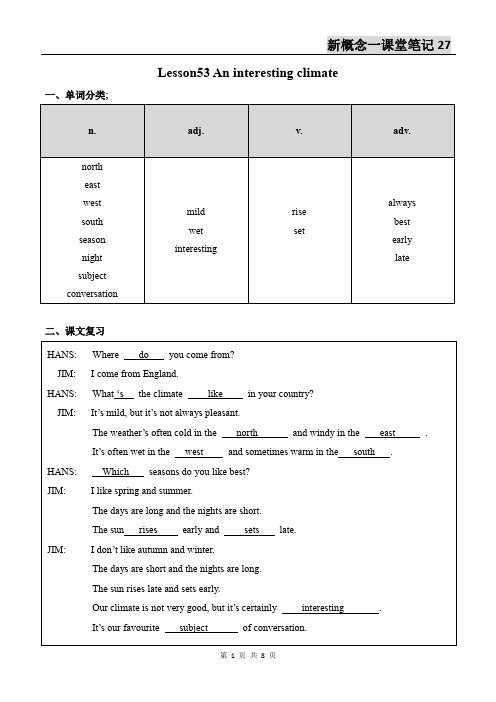
老师正在和Alin谈话。
The teacher is having a conversation with lin.
四、词组
come from
来自...
in the east
在东部
What’s the climate like?
气候怎么样?
in the south
1.What nationality are you?(同义句)
Wheredo youcomefrom?
2.Whichseasons do you likebest?(根据答语写出问题)
I like spring best.
3. I come fromFrance.(对划线部分提问)
Wheredoyou come fron?
Japanese
Nigerian
Turkish
Korean
Polish
Thai
练习:
1.I’m Australian. I come fromAustralia.
2.He’sAustrian. He comes from Austria.
3.He’s Canadian. He comes from.
Lesson53 An interesting climate
1、单词分类;
n.
adj.
v.
adv.
north
east
west
south
season
night
subject
conversation
mild
wet
interesting
rise
set
always
新概念第一册教案 53-54
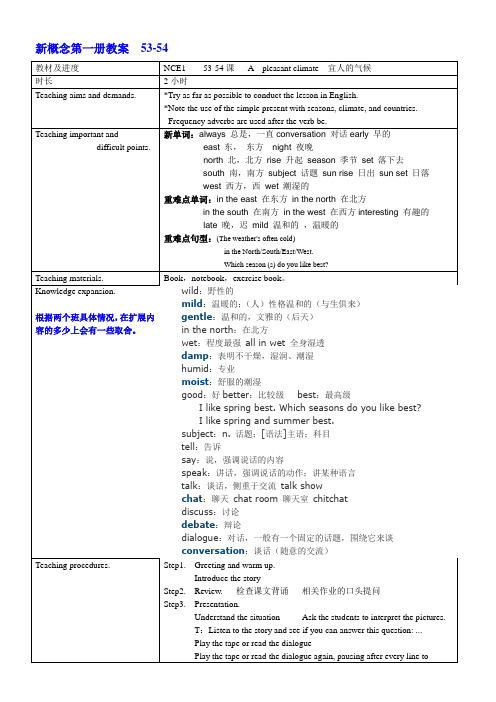
新概念第一册教案53-54教材及进度NCE1 53-54课 A pleasant climate 宜人的气候时长2小时Teaching aims and demands. *Try as far as possible to conduct the lesson in English.*Note the use of the simple present with seasons, climate, and countries.Frequency adverbs are used after the verb be.Teaching important anddifficult points. 新单词:always 总是,一直conversation 对话early 早的east 东,东方night 夜晚north 北,北方rise 升起season 季节set 落下去south 南,南方subject 话题sun rise 日出sun set 日落west 西方,西wet 潮湿的重难点单词:in the east 在东方in the north 在北方in the south 在南方in the west 在西方interesting 有趣的late 晚,迟mild 温和的,温暖的重难点句型:(The weather's often cold)in the North/South/East/West.Which season (s) do you like best?Teaching materials. Book,notebook,exercise book。
Knowledge expansion.根据两个班具体情况,在扩展内容的多少上会有一些取舍。
wild:野性的mild:温暖的;(人)性格温和的(与生俱来)gentle:温和的,文雅的(后天)in the north:在北方wet:程度最强all in wet 全身湿透damp:表明不干燥,湿润、潮湿humid:专业moist:舒服的潮湿good:好better:比较级best:最高级I like spring best. Which seasons do you like best?I like spring and summer best.subject:n. 话题;[语法]主语;科目tell:告诉say:说,强调说话的内容speak:讲话,强调说话的动作;讲某种语言talk:谈话,侧重于交流talk showchat:聊天chat room 聊天室chitchatdiscuss:讨论debate:辩论dialogue:对话,一般有一个固定的话题,围绕它来谈conversation:谈话(随意的交流)Teaching procedures. Step1. Greeting and warm up.Introduce the storyStep2. Review. 检查课文背诵相关作业的口头提问Step3. Presentation.Understand the situation Ask the students to interpret the pictures.T:Listen to the story and see if you can answer this question: ...Play the tape or read the dialoguePlay the tape or read the dialogue again, pausing after every line tocheck the students understand.Play the tape or read the dialogue again, pausing after every line,and ask the students to repeat(a) in chorus,(b) in small groups,(c) individually.Reading aloudAsk one or two students to take parts and to read the dialogue aloud.Step4. Practice.Step5. Summary. Asking questionsStep6. Homework.Reflection. 1.advantage2.disadvantageBoard design。
新概念英语第一册第53课教学设计
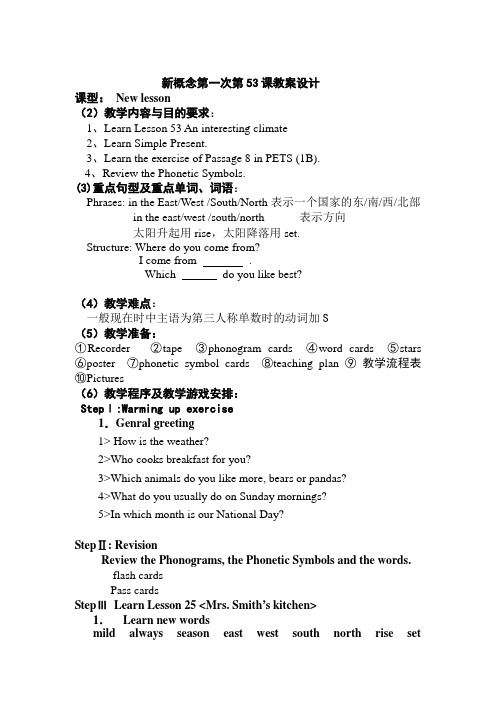
新概念第一次第53课教案设计课型:New lesson(2)教学内容与目的要求:1、Learn Lesson 53 An interesting climate2、Learn Simple Present.3、Learn the exercise of Passage 8 in PETS (1B).4、Review the Phonetic Symbols.(3)重点句型及重点单词、词语:Phrases: in the East/West /South/North表示一个国家的东/南/西/北部in the east/west /south/north 表示方向太阳升起用rise,太阳降落用set.Structure: Where do you come from?I come from .Which do you like best?(4)教学难点:一般现在时中主语为第三人称单数时的动词加S(5)教学准备:①Recorder ②tape ③phonogram cards ④word cards ⑤stars ⑥poster ⑦phonetic symbol cards ⑧teaching plan ⑨教学流程表⑩Pictures(6)教学程序及教学游戏安排:StepⅠ:Warming up exercise1.Genral greeting1> How is the weather?2>Who cooks breakfast for you?3>Which animals do you like more, bears or pandas?4>What do you usually do on Sunday mornings?5>In which month is our National Day?StepⅡ: RevisionReview the Phonograms, the Phonetic Symbols and the words.flash cardsPass cardsStepⅢLearn Lesson 25 <Mrs. Smith’s kitchen>1.Learn new wordsmild always season east west south north rise setinteresting subject conversation climate certainly pleasant favourite(根据福尼斯英语的单词教学步骤进行课文中新单词的教学。
新概念英语第1册第53-54课重点语法

⼀、重要句型或语法 1、⼀般现在时 1)表⽰天⽓,如:The weather's often cold in the North and windy in the East. 2)表⽰⽓候,如:What's the climate like in your country? It's mild, but it's not always pleasant. 3)季节喜好的问答,如:Which seasons do you like best? I like spring and summer. 2、国籍的问答 Where do you come from? I come from England. ⼆、课⽂主要语⾔点 I come from England. England表⽰“英格兰”,但在英语⾥经常⽤来指代整个英国。
It's mild, but it's not always pleasant. mild表⽰“温和的;温暖的”。
可以让学⽣学习使⽤句型:It's ..., but it's not always ...。
The weather's often cold in the North and windy in the East. 英语⾥,东南西北的表达需要梳理。
表⽅位时,要注意东南、东北、西南、西北的表达,英语⾥是:southeast, northeast, southwest, southeast。
此外,当⽅向⾸字母⼤写时,⼀般不再指⽅位,⽽是指地域,如课⽂中的the North就是指北部地区。
Which seasons do you like best? 结合第51课,复习四季的表达。
要注意的是,“秋天;秋季”美语⾥经常⽤fall来表⽰。
The days are long and the nights are short. 可以补充⼀点有关不同季节昼夜长短的变化知识。
新概念53课笔记

【New words and expressions】生词和短语★hot adj. 带电的,充电的热的hot-hot-hot: 麻辣烫hot-wings: 辣鸡翅hot-tempered :火爆(脾气)的hot-line :热线hot topic :热门话题hot cake :热蛋糕hot dog :热狗It sells like a hot cake/cakes.hot :新鲜的best seller: 畅销的东西hot potato :棘手的问题hot news :最热点的新闻hot snake★fireman n. 消防队员hydrant: 消防栓fire extinguisher:灭火器extinguish=put out: 灭火★cause v. 引起; n. 原因cause sth.:引起麻烦Carelessness causes accidents.Pride causes failure.cause sb to do sth. :导致某人做某事Illness caused him to lose his temper Because 因为 be causereason : 理由, cause 原因cause :强调事情发生的直接原因(一个) reason :其他各种的理由(很多个)★examine v. 检查examine the soilcheck :核实,核对★accidentally adv. 意外地,偶然地accident->accidental->accidentally accident :事故unexpectedly :出乎意料地Unexpectedly he didn't go.I met the famous writer accidentally.★remains n. 尸体,残骸dead body★wire n. 电线★volt n. 伏特(电压单位)★power line电力线★solve v. 解决solve the mystery(迷)solve the problem★mystery n. 谜★snatch v. 抓住catch: 抓鱼holdsnatch :突然抓起来seize : 抓住(用力)seize my arm★spark n. 电火花【课文讲解】put out a fire : 扑灭火a fire :一场(堆)火since then: 从那时起到现在为止have been trying to现在完成时强调的是很有可能broken glass :被打碎的玻璃片cigarette ends :烟头be able tobe sure that :对...很有把握quite sure :相当的把握性rather: 相当fairlyquite(=completely)->rather->fairlyquite a few :颇有几个(相当多的)start a fire= cause a fireaccidentally :偶然地unexpectedly :出乎别人意料之外cause :直接原因notice :注意别人不注意的东西woundwind one's way :蜿蜒而行wind vt. 盘旋,缠绕16,000-volt power line连字符一旦加在两个词中间,这个词之间就失去了加复数的资格,能够加连字符的概念一定是做定语in this way :以这种方式explanation:解释had donedropit->snakedo so :这么做I refuse to do sosend 宾补down to the groundthese->sparkshot snake :触电的蛇get an electric shake :触电now that : 既然quite/quietquiet adj. 安静的quite adv. 相当地,非常地,很cause/reasonreason:理由 cause:原因(直接)cause v.1. cause sth..导致,引起2.cause sb to do sth...导致某人做某事reason v.reason with sb 劝说(以道理)beg for sth :乞求什么东西drop/falldrop vt. 宾语(名词或代词),强调的是不小心掉下来fall vi. 无宾语, 强调的是掉下来的概念,动作【Multiple choice questions】6. key phrase : be able to = can, succeed in doing11. in this way 以这种方式 = that's howlike 在英文中不表示方式【Summary writing】1. now that 既然Now that firemen have put out a big forest fire in California,they have been trying to discover its cause.2. 区分同位语和定语从句的区别:如果that做了主语或者宾语,是定语从句如果that即不作主语也不作宾语,是同位语从句5. In winding itself around the wires the snake had sent sparks to the ground and it caused the fire.介词in,on 放在动词-ing前面的理解方式和没有in,on的理解方式一样。
新概念英语第一册 Lesson 53 笔记

2012年7月19日Lesson53An interesting climate授课老师:Rebecca笔记整理:宅家三年不出门d adj.温和的,温暖的,(形容词作定语,表语,)昆明has a mild climate.昆明有一个温暖的天气。
(修饰天气,表示温暖的)She's mild.她的性格很温和。
(修饰人,表示性格温和)This dish tastes mild.这道菜尝起来清单。
(修饰菜肴,表示清淡的,dish菜肴)She is playing pp.他正在打乒乓。
(主谓宾,谓语动词is playing)当be动词作在一个句子中作主动词的时候,表示主系表,there be句型除外。
2.Wet adj.潮湿的,Why are you wet?你为什么湿了?Why is your body wet?为什么你身体湿了?You are all wet.你全身都湿透了。
Because it is raining outside.因为外面在下雨。
作及物动词vt.:Wet.Sth.把...弄湿,打湿Wet the window before cleaning it./Wet the window before you clean it.擦窗子之前先把它打湿。
(介词before后面的动词一定要ing,before除了可以作介词,还可以作连词,作连词后面要跟一个句子,做连词后面的句子,需要补充一个主语。
例如:Because I am girl.)Before4o'clock.介词后面跟名词。
Because表因果的连词,before表时间的连词,后面要跟句子,句子得有一个完整的结构。
He wetted his pants.他尿裤子了。
He wetted himself.他把自己打湿了。
Wet one's bed尿床3.Interesting adj.有趣的,Sting n.蜜蜂的那种刺,v.刺伤This is an interesting book.这是一本有趣的书。
新概念英语第一册第53课课件教案资料

无忧PPT整理发布
season
There are four seasons in a year.
spring summer autumn winter
无忧PPT整理发布
无忧PPT整理发布
England
the Great Britain
Ireland
and Northern
( ) Jim doesn’t like autumn and
winter, because the sun rises late
and sets early.
( ) Climate is English favorite subject
of conversation.
无忧PPT整理发布
四、复述课文
Scotland
England
Welsh
Northern Ireland
无忧PPT整理发布
conversation n. 谈话
say
说话的内容
speak 讲话的动作
talk
谈话,聊天
chat
聊天
dialog 对话—有固定的话题
conversation 谈话(随意型及语法
1. 总的说明英国的气候 2. 分别说明各个地区气候 3. Jim喜欢和不喜欢的季节
及原因 4. 总结性地说出天气是英国人喜欢
谈论的话题
无忧PPT整理发布
See you !
无忧PPT整理发布
此课件下载可自行编辑修改,仅供参考! 感谢您的支持,我们努力做得更好!谢谢
无忧PPT整理发布
My favourite season is spring. Because ...
新概念课堂笔记第一册Lesson53-54

Word Studynight【用法】n.夜晚【词组】at night 夜间,晚上last night 昨天晚上 by night 在夜间day and night 夜以继日地【扩展】in the evening 在晚上(傍晚,黄昏)in the morni ng 在上午 in the after noon 在下午interesting【用法】adj.有趣的,有意思的【辨析】interesting 和 interested (adj.)①interesting 用来修饰物,例如:The story is very in teresti ng.③interested 用来修饰人,例如:I am in terested in light music.表示方向的词east n.东方 south n.南方 20th-- --twe ntieth 30th----thirtieth40th-- --fortieth50th----fiftieth60th-- --sixtieth70th----seventieth80th-- --eightieth 90th----nin etieth100th----hun dredth101st----one hun dred and first 102nd-——one hun dred and sec ond103rd-——one hun dred and thirdwest n.西方 north n.北方…表示在某Text Explanation一范围内的东南西北,比如:Shan ghai is in the east of China. 上海在中国的东方。
② on the east/south/west/northof …表示在某一范围之外的东南西北, 且接壤,比如:Russia is on the north of China.俄罗斯在总 过的北面。
(接壤)◎ to the east/south/west/north of … 表示在某 一范围之外的东南西北, 不接壤,比如:Japan is to the east of China.日本在中国的 东面。
新概念 1 Lesson 53~ 54

一、单词& 课文d adj. 温和的、温暖的、文雅的温和的气候mild climate 温和的天气mild weather温暖的n./v./adj. 宜人的、舒适的天气晴朗的多雨的多雪的多风的多雾的问气候:---What’s the climate like ... ? --- It’s ... .问天气:---What’s the weather like ... ?/ How’s the weather ... ? ---It’seg1. 你们国家的气候怎么样?the your ? eg2. 气候非常的宜人。
very .eg3. 澳大利亚的气候怎么样?the ? eg4. 气候非常的温和。
very .eg5. 春天的天气怎么样?the ?the ? eg6. 非常的温暖。
very .2.总是属于副词一般用于时态经常、常常经常有时候很少、几乎不/ 从未、从不3.东方east n./adj./adv. eastern adj. 西方west n./adj./adv. western adj. 南方south n./adj./adv. southern adj. 北方north n./adj./adv. northern adj.在东边in the east在...的东边in the east of ...East 东部东方国家eastern countrieseg1. 他住在美国的东边。
He lives in the east of America. = He lives in America. eg2. 东部的天气经常很寒冷。
The weather’s cold the .It’s cold the .eg3. 南部有时候是温暖的。
warm .eg4. 西部经常是潮湿的。
. eg5. 北部经常下雨。
It the .eg6. 北部经常是多雨的。
It the . 4.wet n. 雨天湿气dry n. 干涸v. 弄湿v. 把...弄干adj. 潮湿的adj. 干燥的、口渴的、枯燥无味的eg1. 天气非常的潮湿。
新概念第一册53课Lesson53完整 (2)

动词原形变第三人称单数的规则与发音规律同
名词单数变复数大致相同
1、大多数动词在词
①stop-stops ②read-reads
[s] ; make-makes [s]
[z] ; play-plays [z]
动词第三人称单数
always 总是(频率副词从大到小) 一直 usually 通常 often 经常 sometimes 有时 seldom 很少 never 从不 频率副词位置:be动词、助动词、情态动词 后,实意动词前(三词后,一词前)
always
方位的表达
north N east E west W
1. 我们每天都 喝牛奶。 Every day we drink milk. 2.我们总在下午上英语课。 We always have English classes in the afternoon. 3.她通常下课后打篮球。 She usually plays basketball after school.
Present simple tense
*频率副词频率大小排列
always>usually>often>sometimes 用于一 般现在时
Things are always 1. 客观事实
一 We are boys. 般 The moon goes round 现 在 the earth. 时 Things are true now 的 2. 符合现在事实情况 三 种 You are 17. 用 He is a student. 法
2、以辅音字母加“y”结尾的,要先将“y”变为 “i”,然后在加“es”读[iz] 如 fly-flies [z]; carry-carries [z] study-studies [z]; worry-worries 3、以“s, x, ch, sh”结尾的,在词尾加“es”,发 音为[iz] 如:
新概念第一册词汇语法第53课:An interesting climate
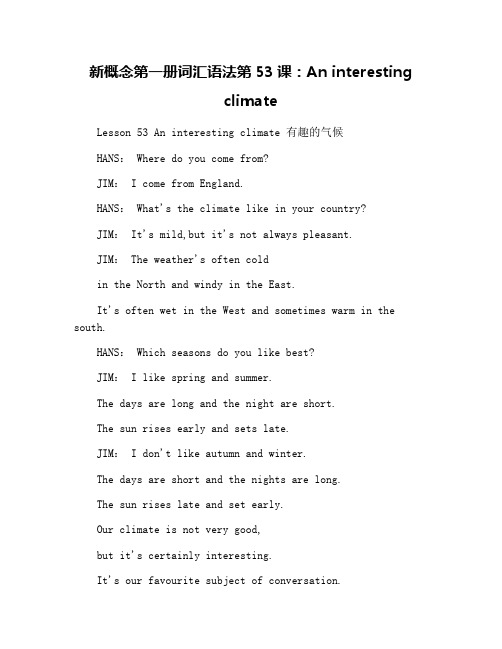
新概念第一册词汇语法第53课:An interestingclimateLesson 53 An interesting climate 有趣的气候HANS: Where do you come from?JIM: I come from England.HANS: What's the climate like in your country?JIM: It's mild,but it's not always pleasant.JIM: The weather's often coldin the North and windy in the East.It's often wet in the West and sometimes warm in the south.HANS: Which seasons do you like best?JIM: I like spring and summer.The days are long and the night are short.The sun rises early and sets late.JIM: I don't like autumn and winter.The days are short and the nights are long.The sun rises late and set early.Our climate is not very good,but it's certainly interesting.It's our favourite subject of conversation.参考译文汉斯:你是哪国人?吉姆:我是英国人。
汉斯:你们国家的气候怎么样?吉姆:气候温和,但也不总是宜人的。
吉姆:北部的天气常常寒冷,东部则常常利风。
西部常下雨,南部有时则很暖和。
新概念英语第一册53课笔记

Lesson 53 An interesting climate Bettyd adj①温和的,温暖的 a mild climate We had a mild winter last year. 我们去年过了一个温暖的冬天。
②(性情)温和的gentle 指后天的一种修养,文雅的John is a mild man.③味道淡的Try this mild dish. 尝尝这个味道淡一点的菜。
His grandfather likes the mild taste. 他的爷爷喜欢这个清淡的味道。
wild adj. 野性的,野蛮的 a wild elephant2.always adv. 总是Do you always stay at home in the evening? Not always.The boy is always asking why. 这个男孩总是问着问那没个完。
The baby always cries at night.She is always late for school.She always reads in bed. 她总是躺在床上看书。
3.north n.北方/adj. 北方的in the north of…在…的北部Hebei Province is in the north of China.[ˈprɒvɪns] 河北省在中国的北部4.east n.东方/adj. 东方的The red sun rises in the east. 红太阳在东方升起。
northeast 东北部、东北in the northeast5.wet adj. 潮湿的dry adj. 干的v.变干[draɪ]wet clothesbe/get wet through 全身湿透了Don’t go out. You’ll get wet through. My coat is wet through.6.west n.西方/adj. 西方的In the west northwest 西北7.south n.南方/adj. 南方的Southwest西南southeast 东南8.season n.季节spring, summer, autumn/fall, winterAutumn is the best season for travel. [ˈtrævl]In the high season 在旺季In the low season 在淡季9.best adv. 最I like winter. I like winter best.10.night n. 夜晚In the morining/afternoon/eveningat night在夜里all night (long)整夜day and night 整日整夜He often comes home from work at night. 他经常天黑才下班回家。
新概念第一册53课自学导读

新概念第一册53课自学导读第一部分:课文分析Lesson 53:Your passport, please.本课是关于口语方面的实用对话,主要学习如何向别人要护照和如何交给别人护照。
全文共分为三段。
第一段是一名酒店服务员向旅客要护照的对话。
第二段是旅客向服务员报告自己护照遗失的对话。
第三段是服务员再次询问旅客的护照是否找到了的对话。
第一段对话中,服务员使用了两个询问句型:"Can I have your passport, please?"和"Could you give me your passport, please?",这两个句型在日常生活中经常使用。
面对不同的场合,我们需要选择合适的句型来表达自己的意思。
同时,服务员在要求护照时,还会问旅客"Would you like to pay in cash?",语言形式礼貌得体,让人感到舒适自然。
在第二段对话中,旅客主动告诉服务员自己的护照丢失了,服务员问了一句"What happened to your passport?",这是省略了助动词的一个简洁句,是一句非正式的口语表达方式。
在交流过程中,不一定要使用完整的句子,有时简单而有力的语言效果更加显著。
第三段对话中,服务员再次询问旅客的护照是否找到了,表达了关切之情。
同时,服务员告诉旅客"Please let us know if you find it,",这是一个委婉的请求,语言礼貌得体。
本课主要运用到的语法点为现在完成时以及形容词的使用。
现在完成时的构成为HAVE/HAS + P.P。
这种时态意味着动作或状态在过去发生或开始,但是到现在仍然存在或有所影响。
例如"I have lost my passport."表示的是我遗失了护照,但是目前还没有找到,所以我的状态是没有护照。
新概念英语第53课教案

Lesson 53 Hot snake上课时间:上课地点:教学用书:新概念二教学目标: ①掌握生词和短语cause cause sb to do sth remainssolve……②掌握现在完成进行时与现在完成时用法教学重难点:现在完成进行时与现在完成时用法及区别教学过程:阅读文章回答问题1、What are forest fires often caused by ?2、What led the fireman to discover the cause of the fire?3、What was the explanation?一、单词教学1.hot adj 热的,炎热的It is very hot today. 今天很热。
Strike while the iron is hot.趁热打铁.hot 炎热的warm 温暖的cool 凉爽的chilly 寒冷的cold 寒冷的,严寒的2.调味品辣的Pepper and mustard are hot.辣椒和芥末是辣的.强烈的,激烈的,热烈的.have a hot temper 脾气暴躁a hot potato 棘手或讨厌的事物或情况2.cause(1)V. 引起cause sth : 引起(麻烦)Carelessness causes accidents.粗心导致事故Pride causes failure骄傲使人失败cause sb to do sth引起某人做某事, 导致某人做某事2)n. 原因cause : 强调事情发生的直接原因(一个)Do you know the reason of the war?你知道这场战争发生的原因么?reason : 其他各种的理由(很多个)Give me your reasons for going there.请告诉我你去那里的原因。
3.★examine1)v. 仔细观察,检查,调查The firefighters examined every inch of the forest.消防队员检查了森林的每一寸土地。
新概念英语第一册自学笔记含课后练习答案:Lesson53-54
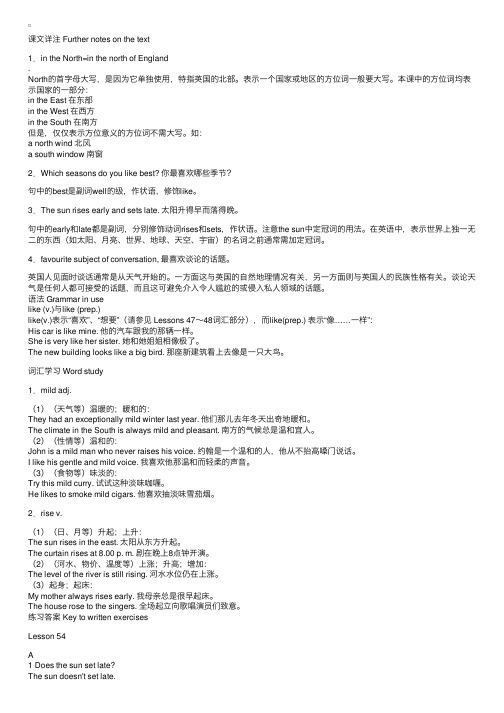
课⽂详注 Further notes on the text1.in the North=in the north of England.North的⾸字母⼤写,是因为它单独使⽤,特指英国的北部。
表⽰⼀个国家或地区的⽅位词⼀般要⼤写。
本课中的⽅位词均表⽰国家的⼀部分:in the East 在东部in the West 在西⽅in the South 在南⽅但是,仅仅表⽰⽅位意义的⽅位词不需⼤写。
如:a north wind 北风a south window 南窗2.Which seasons do you like best? 你最喜欢哪些季节?句中的best是副词well的级,作状语,修饰like。
3.The sun rises early and sets late. 太阳升得早⽽落得晚。
句中的early和late都是副词,分别修饰动词rises和sets,作状语。
注意the sun中定冠词的⽤法。
在英语中,表⽰世界上独⼀⽆⼆的东西(如太阳、⽉亮、世界、地球、天空、宇宙)的名词之前通常需加定冠词。
4.favourite subject of conversation, 最喜欢谈论的话题。
英国⼈见⾯时谈话通常是从天⽓开始的。
⼀⽅⾯这与英国的⾃然地理情况有关,另⼀⽅⾯则与英国⼈的民族性格有关。
谈论天⽓是任何⼈都可接受的话题,⽽且这可避免介⼊令⼈尴尬的或侵⼊私⼈领域的话题。
语法 Grammar in uselike (v.)与like (prep.)like(v.)表⽰“喜欢”、“想要”(请参见 Lessons 47~48词汇部分),⽽like(prep.) 表⽰“像……⼀样”:His car is like mine. 他的汽车跟我的那辆⼀样。
She is very like her sister. 她和她姐姐相像极了。
The new building looks like a big bird. 那座新建筑看上去像是⼀只⼤鸟。
新概念英语第一册第53课教学文案

英国:大不列巅及 北爱尔兰联合王国
England 英格兰 Scotland 苏格兰 Northern Ireland 北爱尔兰 Wales 威尔士
Ireland 爱尔兰
north
1.What is the favourite subject of conversation in
England?
2.What's the climate like in England?
Lesson 53 An interesting climate
New words and new expressions:
Spring Summer Autumn Winter
What’s the weather like in the North? It’s cold in the North.
What’s the weather like in the East? It’s windy in the East.
What’s the weather like in the West? It’s wet in the West.
north
east east [iːst] n. 东方
west
west [west] n. 西方
in the east 在东方
in the west 在西方
go west 去死south south [sauθ] n. 南方
in the south 在南方
North
In
West
East
South
season [‘si:zən] n. 季节
新概念英语53课讲义
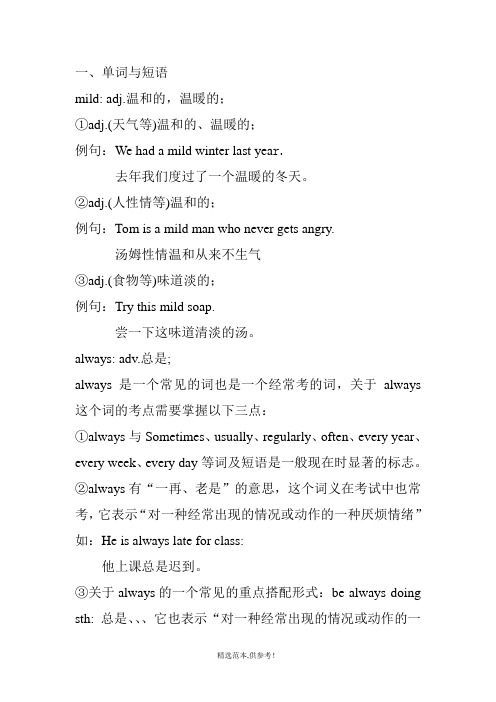
一、单词与短语mild: adj.温和的,温暖的;①adj.(天气等)温和的、温暖的;例句:We had a mild winter last yea r.去年我们度过了一个温暖的冬天。
②adj.(人性情等)温和的;例句:Tom is a mild man who never gets angry.汤姆性情温和从来不生气③adj.(食物等)味道淡的;例句:Try this mild soap.尝一下这味道清淡的汤。
always: adv.总是;always是一个常见的词也是一个经常考的词,关于always 这个词的考点需要掌握以下三点:①always与Sometimes、usually、regularly、often、every year、every week、every day等词及短语是一般现在时显著的标志。
②always有“一再、老是”的意思,这个词义在考试中也常考,它表示“对一种经常出现的情况或动作的一种厌烦情绪”如:He is always late for class:他上课总是迟到。
③关于always的一个常见的重点搭配形式:be always doing sth: 总是、、、它也表示“对一种经常出现的情况或动作的一种厌烦情绪”。
如:He is always asking silly questions.他总是问些愚蠢的问题。
方位的表达:east: n.东方;west: n.西方;south: n.南方;north: n.北方;补充:northeast东北;northwest西北;southeast东南;southwest 西南;另外在方位前一定要加定冠词the。
wet: adj.潮湿的;season: n.季节;best: adv.最;adj.最好的;n.最佳者,最好的东西;best这个词在英语中也是经常考的词,关于这个词在中学阶段应该重点掌握以下三点:①best 是形容词good和副词well的最高级形式表示“最好的”的意思。
新概念英语第一册课文翻译及学习笔记Lesson53
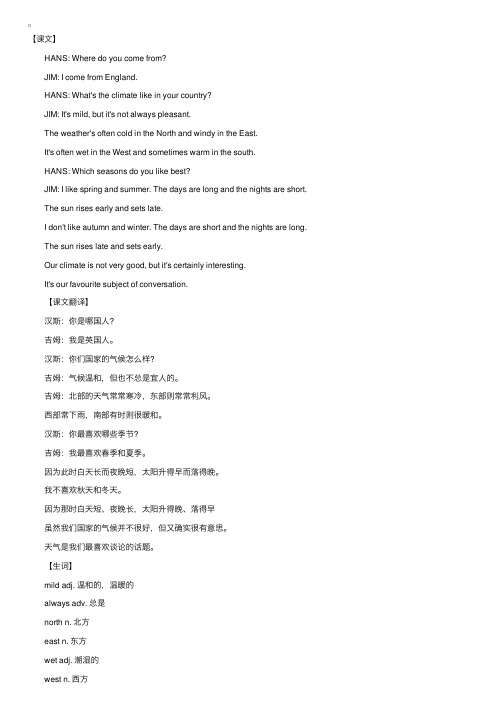
【课⽂】 HANS: Where do you come from? JIM: I come from England. HANS: What's the climate like in your country? JIM: It's mild, but it's not always pleasant. The weather's often cold in the North and windy in the East. It's often wet in the West and sometimes warm in the south. HANS: Which seasons do you like best? JIM: I like spring and summer. The days are long and the nights are short. The sun rises early and sets late. I don't like autumn and winter. The days are short and the nights are long. The sun rises late and sets early. Our climate is not very good, but it's certainly interesting. It's our favourite subject of conversation. 【课⽂翻译】 汉斯:你是哪国⼈? 吉姆:我是英国⼈。
汉斯:你们国家的⽓候怎么样? 吉姆:⽓候温和,但也不总是宜⼈的。
吉姆:北部的天⽓常常寒冷,东部则常常利风。
西部常下⾬,南部有时则很暖和。
汉斯:你最喜欢哪些季节? 吉姆:我最喜欢春季和夏季。
因为此时⽩天长⽽夜晚短,太阳升得早⽽落得晚。
- 1、下载文档前请自行甄别文档内容的完整性,平台不提供额外的编辑、内容补充、找答案等附加服务。
- 2、"仅部分预览"的文档,不可在线预览部分如存在完整性等问题,可反馈申请退款(可完整预览的文档不适用该条件!)。
- 3、如文档侵犯您的权益,请联系客服反馈,我们会尽快为您处理(人工客服工作时间:9:00-18:30)。
dadj
①温和的,温暖的a mild climateWe had a mild winter last year.我们去年过了一个温暖的冬天。
②(性情)温和的gentle指后天的一种修养,文雅的John is a mild man.③味道淡的Try this mild dish.尝尝这个味道淡一点的菜。
His grandfather likes the mild taste.他的爷爷喜欢这个清淡的味道。
wildadj.野性的,野蛮的a wild elephant
2.alwaysadv.总是
Do you always stay at home in the evening?Not always.
The boy is always asking why.这个男孩总是问着问那没个完。
The baby always cries at night.
She is always late for school.
She always reads in bed.她总是躺在床上看书。
3.northn.北方/adj.北方的
in the north of…在…的北部Hebei Province is in the north of China.[ˈprɒvɪns]河北省在中国的北部
4.eastn.东方/adj.东方的
The red sun rises in the east.红太阳在东方升起。
northeast东北部、东北in the northeast
5.wetadj.潮湿的
dryadj.干的v.变干[
draɪ]
wet clothes
be/get wet through全身湿透了
Don’t go out. You’ll get wet through.My coat is wet through.
6.westn.西方/adj.西方的
In the westnorthwest西北
7.southn.南方/adj.南方的
Southwest西南southeast东南
8.seasonn.季节spring, summer, autumn/fall, winter
Autumn is the best season for travel.
[ˈtrævl]
In the high season在旺季
In the low season在淡季
9.bestadv.最
I like winter.I like winter best.
10.nightn.夜晚
In the morining/afternoon/evening
at night在夜里all night(long)整夜day and night整日整夜
He often comes home from work at night.他经常天黑才下班回家。
11.rise
①v.升起,上升The sun rises in the east.太阳从东方升起。
②v.起身,起床My mother always rises early.我母亲总是很早起床。
12.early
①adv.早You must come home early.(early是副词修饰动词come)②adj.早的in the early morning一大早(early是形容词,修饰名词morning)
13.setv.(xx)落下去
In summer, the sun sets late.
sunsetn.日落sunrisen.日出
te
Sorry, mum. I’m late for dinner.
15.interestingadj.有趣的,有意思的反义词:dull:uninteresting [dʌl]
The film is very interesting.这部电影很有趣。
Are these books interesting?That is an interesting game.be interested in…对…感兴趣
He is interested in English.
We are interested in the book.物做主语,多用interesting人做主语,多用interested
16.subject
①.n.话题,题目Let’s change the subject.让我们改变话题吧。
We must return to our subject.我们该回到我们的话题上。
②.n.学科We learn eight subjects a year.
[lɜ:n]学习
17.conversationn.谈话
be in conversation with…与…谈话中
She is in conversation with the boss.
talk:Let’s have a talk.
18.Question:
①What’s the climate like in England?
②Which season does John like?
19.in the North=in the north of Enland
north首字母大写,因为它单独使用,特指英国的北部。
表示一个国家和地方的方位词,一般要大写。
In the West/East但是,仅仅表示方位意义的方位词,不需要大写。
north wind北风south window南窗
20.favourite
①adj.最喜欢的English is my favourite subject.
②n.最喜欢的人或物These shoes are my favourites.。
